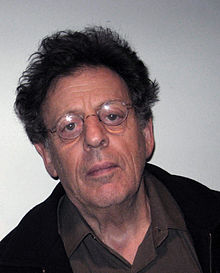 I interviewed Philip Glass live in front of an enthusiastic student/faculty audience at Bard tonight. It’s the second time I’ve done such a thing; the first was about 15 years ago in NYC, and Phil and I couldn’t remember what school it was. But Phil insisted on writing my introduction for him, saying, “These students may not know who I am.” And here is the entirety of the autobiographical part he wrote: “He began, as a composer, at the age of 20, and has thus far spent 55 years in this general line of work.” I said to the audience, “If you didn’t know who Philip Glass was, you do now.” He absolutely refused to let me detail his “so-called,” as he put it, accomplishments. He was charming and insightful, as always, and the student enthusiasm was beyond my wildest expectations.
I interviewed Philip Glass live in front of an enthusiastic student/faculty audience at Bard tonight. It’s the second time I’ve done such a thing; the first was about 15 years ago in NYC, and Phil and I couldn’t remember what school it was. But Phil insisted on writing my introduction for him, saying, “These students may not know who I am.” And here is the entirety of the autobiographical part he wrote: “He began, as a composer, at the age of 20, and has thus far spent 55 years in this general line of work.” I said to the audience, “If you didn’t know who Philip Glass was, you do now.” He absolutely refused to let me detail his “so-called,” as he put it, accomplishments. He was charming and insightful, as always, and the student enthusiasm was beyond my wildest expectations.
Let me add that I don’t write much about Glass, partly because I take him so much for granted. In the ’70s I was blown away by Music in Fifths, Music with Changing Parts, Music in Twelve Parts, and Einstein on the Beach, in that order, and afterward I almost quit paying attention, because his music had already had all the effect it could have. His rhythmic cycles and voice-leading became part of my compositional DNA, and into that I stirred Feldman, Nancarrow, Johnston, Young, Ashley, several other composers. At that earlier interview, I told him that I was still trying to rewrite the “Bed” scene from Einstein, and he replied, “So am I.” And a few months ago I was offered an opportunity to have a Glass-related piece performed at a Glass 75th-birthday festival which has now been postponed; but I wrote the piece anyway, titled Going to Bed, based on the chords from that “Bed” scene. The PDF is here. I find his output very uneven, as with all extremely prolific composers, but lately I’ve been enjoying Orion, the Eighth Symphony, and the Tirol Piano Concerto.
